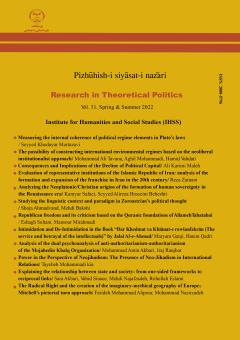Studying the linguistic context and paradigm in Zoroastrian’s political thought
Subject Areas : پژوهش سیاست نظری
shoja ahmadvand
1
,
Mehdi Bakhshi
2
*
![]()
1 - Associate Professor, Department of Political Science, AllamehTabataba’i University, Iran
2 - PhD Student in political thought, AllamehTabataba’i University, Iran.
Keywords: Zoroastrian, historiography, John Pocock, Context, Paradigm,
Abstract :
The period of Sassanid rule in terms of religious history is the most important period of ancient Iran. In this period, the government takes on a completely religious aspect, and a great change takes place that affects the religion and national customs of the Iranians. Zoroastrian thought is very important in this period, so understanding Zoroastrian political thought is not possible without establishing a connection between the historical and political conditions of the formation and continuation of the Sassanid Empire and the linguistic paradigm of Zoroastrian political theology. Thus, first, the context and then the dominant linguistic paradigm in this historical period must be examined. The purpose of this article is to examine Zoroaster and his religion in the context of historical and political developments. The basis of this article is: to provide an analysis of the historical and political conditions of Iran in the Sassanid era, to study the political theology of Zarathustra as the dominant linguistic paradigm of that period, and to understand the political thought of the Prophet Zarathustra through this. The method of the article is John Pocock’s historiography in which history has a central place and by studying the historical and political context, on the one hand, and the dominant linguistic paradigms, on the other hand, a common context is formed between the historian or the reader and writer in which the mentioned text can be understood. Of course, efforts will be made to analyze these elements through the analysis of the content of the important book of Zoroaster, the Avesta. The findings of this article show that the religion of Zoroaster was the founder and shaper of the civilization of ancient Iran and the components of the linguistic paradigm of Zoroastrian political thought, called for the establishment of a strong and glorious prince in Iran. The article concludes that considering the historical-political conditions of Iran at the beginning of the Sassanid dynasty, and based on the linguistic paradigm of Zoroastrian political thought, ArdeshirBabakan used Zoroastrian religion to gain power and unite Iranians and also the country.
احمدوند، شجاع و روح¬الله اسلامی (1397) اندیشه سیاسی در ایران باستان، تهران، سمت.
احمدوند، شجاع و احمدرضا بردبار (1398) «مبانی دینی دولت در ایران باستان از دوره اساطیری تا دولت هخامنشی»، فصلنامه دولت¬پژوهی، دانشکده حقوق و علوم سیاسی، سال پنجم، شماره 19، پاییز، صص 81-106.
اردستانی، علی (1391) «بنیاد دولت در ایران: امری نظری یا عملی؟»، مجله سیاست، شماره 21، بهار، صص 39-58.
انصاری، بهمن (1396) زرتشت و زرتشتیان، تهران، آرون.
انصافی، مصطفی و شجاع احمدوند (1398) «دین و دولت در عهد ساسانی؛ درآمدی بر الهیات سیاسی زرتشت»، فصلنامه علمی رهیافت¬های سیاسی و بین¬المللی، دوره یازدهم، شماره 1، پاییز، صص 34-57.
اوستا، کهن¬ترین سرودها و متن¬های ایرانی (1371) گزارش و پژوهش جلیل دوستخواه، تهران، مروارید.
رجایی، فرهنگ (1375) تحول اندیشه سیاسی در شرق باستان، چاپ دوم، تهران، قومس.
رضایی¬راد، محمد (1389) مبانی اندیشه سیاسی در خرد مزدایی، چاپ دوم، تهران، طرح نو.
سلگی، محسن و شجاع احمدوند (1397) «نسبت آرمان و واقعیت در اندیشه سیاسی زرتشت، مانی و مزدک در دوره ساسانی»، پژوهشنامه علوم سیاسی، سال سیزدهم، شماره دوم، بهار، صص 7-32.
سودآور، ابوالعلاء (1383) فره ایزدی در آیین پادشاهی ایران باستان، ایالات¬متحده آمریکا، هوستون، میرک.
صیامیان، زهیر و دیگران (1396) «مبانی کیهان¬شناختی اندیشه سیاسی ایرانشهری با تأکید بر منابع زرتشتی»، مطالعات تاریخ فرهنگی، سال هشتم، شماره 31، بهار، صص 107-128.
طباطبایی، سید جواد (1382) درآمدی فلسفی بر تاریخ اندیشه سیاسی در ایران، چاپ ششم، تهران، کویر.
عنایت، حمید (1385) نهادها و اندیشه¬های سیاسی در ایران و اسلام، با تصحیح و مقدمه صادق زیباکلام، چاپ چهارم، تهران، روزنه.
قهرمان، میثم (1393) «زرتشت، امر سیاسی و اندیشه¬های شکل¬گیری امپراطوری ساسانی»، رهیافتهای سیاسی و بین¬المللی، سال پنجم، شماره 38، تابستان، صص 141-161.
کریستن¬سن، آرتور امانوئل (1364) ایران در زمان ساسانیان، تهران، دنیای کتاب.
کوه¬کن، محمودرضا (1395) «بررسی تأثیر یکتاگرایی آیین زرتشت بر تفکر سیاسی در ایران»، کنگره بین¬المللی علوم اسلامی، علوم انسانی، تهران، آذر ماه.
محمودی، محسن (1388) «زرتشت؛ حکمت و سیاست»، رهیافت¬های سیاسی و بین¬المللی، شماره 18، صص 219-254.
ولـف، مارینـا نیکولایونـا (1394) فلسـفه یونانی متقدم و ایران باسـتان، ترجمه سـیاوش فراهانـی، تهران، حکمت.
James, Samuel (2019) "J. G. A. Pocock and the idea of the ‘Cambridge School’ in the history of political thought", History of European Ideas, Vol. 45, Issue 1, pp. 1-17.
Pocock, John G. A. (1962) "The History of Political Thought: a methodological Inquiry", In: Pocock, John G. A. Political Thought and History, Essays on Theory and Method, Cambridge University Press, 2009, pp. 2-19.
---------------------- (1971) " Working on Ideas in time", In: Pocock, John G. A. , Political Thought and History, Essays on Theory and Method, Cambridge University Press, 2009, pp. 20-32.
----------------------- (1973) "Verbalizing a Political act: towards a politics of Speech", In: Pocock, John G. A., Political Thought and History, Essays on Theory and Method, Cambridge University Press, 2009, pp. 33-50.
---------------------- (1981) "The Reconstruction of Discourse: Towards the Historiography of Political Thought", In: Pocock, John G. A. , Political Thought and History, Essays on Theory and Method, Cambridge University Press, 2009, pp. 67-86.
-------------------- (2009) Political Thought and History, Essays on Theory and Method, Cambridge University Press.
Sheppard, Kenneth (2015)"J. G. A. Pocock as an Intellectual Historian", in Whatmore, Richard, and Young, Brian (eds) A Companion to Intellectual History, Wiley Blackwell, pp. 114-125.

